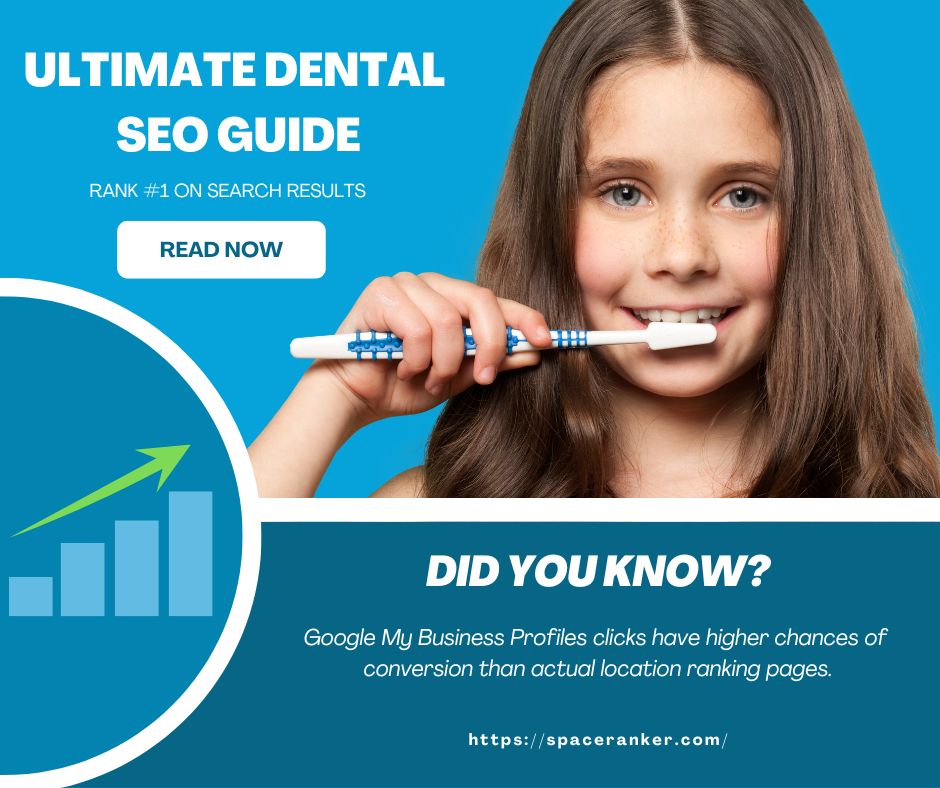If you landed on this page, you already own a dental practice clinic and Googled something along the lines of “dental SEO”. So chances are that you just started and are looking to get more patients into your dental practice, or you’re looking to expand your customer base by acquiring new patients into your dental clinic.
That’s where SEO plays an essential role in today’s world of digital marketing. While digital marketing covers a wide range of online activities to drive conversions and increase your clientele, most of these options include a massive amount of investment and require the skills of a marketing expert to get it right and start to see results.
While investments in marketing channels such as Google Ads, Facebook, and Instagram might bring in results, the spending is high compared to the monetary return you get from your clients.
On the other hand, investing in SEO and letting actual SEO experts handle your digital marketing is a long-term play that brings in more value than other marketing channels and is a much more targeted approach.
GET IN TOUCH
BOOK YOUR STRATEGY CALL TODAY!
What is Local SEO for Dentists?
Do you remember Yellow Pages, which was people’s go-to when searching for businesses that offer dental services? Well, think of SEO as the “Yellow Pages” of the modern area of the internet.
If you have a problem with your teeth, you Google it. If you want to know if teeth whitening is bad for you, you Google it. If you want to find a clinic that offers dental services near you, you Google it again.
So let’s say that someone is suddenly having a toothache and wants to get their teeth checked up. The first thing they do is Google “dental services near me,” and that’s where SEO practices strike.
We want to get your site up in the top 10 Google organic search results for that keyword and the first few Google maps results.
Now, how do we get to rank on the first page for these dental SEO terms, a.k.a related keywords?
Many factors come into play, and based on our years of experience in the space as a digital SEO agency, we’re listing the top-ranking factors that moved the needle for our clients and continue to perform up until today.
Dental Search Engine Optimization
Optimizing content is undoubtedly one of the most crucial ranking factors.
Content optimization is your go-to for getting your dental practice website to rank for keywords related to dental implants, teeth fixing, teeth whitening, or aesthetics.
Writing content is one thing, but getting it to rank in Google is a different story, and that’s where dental SEO services come in handy.
Dental search engine optimization includes optimizing on-page elements such as page titles, meta descriptions, title tags, headers, alt images, URL slug, etc., to top search engine rankings for related keywords to dental practice owners.
You’re probably asking yourself, what if my competitors are doing the same thing? How does Google know which site to prioritize?
Well, if we’re talking about local SEO(for terms like dental practices near me), the search results depend on where the search is completed.
To signal Google that we are the right business to show up when the user searches for dental-relevant keywords for location-based queries(terms), we have to do local citations of your dental website, which brings us to the next factor.
Local Citations for Your Dental Practice Website
The first thing we do with new clients who own dental practices is: intensely focus on expanding their coverage on relevant local citation directories that generate a lot of organic traffic.
This will ensure that you’ll start experiencing more website visitors and getting more patients to your dental office and send signals to Google that your local presence is strong in your target area.
This will help our optimized content rank higher in search engines for our focus keywords.
Some examples of relevant strong dental citations are as follows:
- American Dental Association (ADA)
- America’s Pediatric Dentists
- Dentist Directory
- 1-800-Dentist
- Every Dentist
- Wellness
- Super Dentists
When working on citations for your dental business, one thing to ensure is to provide accurate information on each of the directories. Information such as your dental practice business name, address, phone number, website, and services you offer must match.
Search engines focus on providing users with search results that provide accurate information about their business across different local directories, thus making their online journey of finding a dentist as easy as possible.
While we mentioned some quality directories to include in your citation list, the one which undoubtedly has the most importance is: Google My Business(GMB).
Download Our GMB Optimization Audit Checklist for FREE
We will dedicate a whole section on how to make the best use of it and boost your presence in people’s local searches for dental practices.
Google My Business is a MUST for your Local Dental SEO
A local business that engages in digital marketing should have a Google My Business account to appear in search engine results for dental search terms.
After you’ve created your account, you’ll need to verify and then optimize it for your SEO strategy.
Compared with other local citations and the information you need to provide, in GMB, you must specify what payment methods you accept and your business hours.
Unfortunately, dental search engine optimization doesn’t end with opening a GMB account and optimizing it once.
Your dental SEO efforts need to be continual, especially when you notice a downtrend change in rankings for your target keywords and an uptrend for your competitors. This might indicate that Google made algorithm changes and impacted your dental website.
In cases like this, you need to log back into your GMB listing and do some search engine optimization.
Things to look out for are: adding new dental services that GMB recently added as options for your niche. If you offer those in your clinic, include them in your listing.
An extra step you can take here search engine optimization-wise is to write a unique description for each service that you offer with a special discount. Try to add relevant keywords to your services to increase the likelihood of your local SEO rankings. If you are unsure of what keywords to use, and which ones people search for the most on Google, let an experienced dental SEO company do keyword research for you, and unfold content creation opportunities.
Keyword research is an essential factor to strive in dental marketing.
One more tip when adding your services is to assign each of the services to the correct categories in your GMB account.
SEO TIP: Google loves finding accurate information about physical businesses across local directories.
Google Reviews on Your GMB Listing Matter for Your Dental SEO
Another vital thing to do to boost your online visibility in organic search results and attract prospective patients is to ask your new patients kindly to leave a review on your official dental GMB account.
This is an essential factor to get your search engine rankings up in Google Maps.
You could easily add a link on your dental website which sends your new patients directly to review their experience in your clinic.
You can also create a QR code for free, print them as stickers and have them placed around your dentistry, and encourage the new patients to leave you a review. They will just have to scan the code with their smartphones and be directed to the review section of your GMB page.
If you experience that new patients aren’t bothering to leave reviews, offer them something in exchange, such as a 10% off on your next visit coupon if they write a review on your GMB page.
This way, you will not only get a review but also give your new patients an additional reason to come back for your dental services in the future.
Site Structure of Your Dental Website
The importance of site structure can’t be emphasized enough when working on your dental SEO marketing strategy.
Imagine a user searching on Google for “professional teeth whitening services”, and your site pops up on the top search engine results because we already worked on all the abovementioned factors. User starts navigating through your site looking to get more information on the teeth whitening service, such as the process itself, if are there any factors that might prevent someone from proceeding with the service, costs, etc.
The user starts having difficulty finding the service they are looking for on your site and leaving your website.
That’s how potential patients are lost, and money is left on the table.
Unfortunately, in the case mentioned above, the individual isn’t patient enough to surf your site, which is the case for most internet users that get frustrated if they can’t find things they look for fast on a website.
That’s one of the reasons why websites experience up to 70% of bounce rate and, as a result, affect conversion rates. While this seems minor, our experience shows that many dental websites don’t have services added to their navigational menu and are missing out on potential patient conversions.
We noticed this issue on one of our recent client’s dental practice websites, where they didn’t include any indication of their services.

While a “schedule appointment” page is great to include in the top menu, people tend first to look at your services and get more information on your clinic. They also, check reviews of previous dental patients of yours, and then move forward with scheduling an appointment.
This is where adding “dental services” to the menu would ensure potential patient searches wouldn’t end up bouncing from your site 2 seconds after they entered.
To further strengthen user engagement on your site, try adding sub-menus for different pages on each of the services you offer.
By doing this, users won’t have to scroll and read through a page showcasing all of the services you offer. They might be interested in a specific one you provide at your clinic, and a single page for each would also work better in terms of conversion and organic keyword rankings.
Another strategy to optimize your website structure is by integrating cookies into your website’s framework so it offers you the opportunity to decipher potential customer behavior with finesse. By adeptly analyzing their digital footprints, these unobtrusive packets of data unveil invaluable insights into browsing patterns, page preferences, and interaction tendencies.
However, it’s crucial to uphold the principles of privacy and transparency; hence, prior to adding cookies to your website, soliciting explicit cookie consent stands as an ethical imperative. With these ethical foundations in place, the judicious use of cookies empowers you to traverse the labyrinthine corridors of user engagement.
By deciphering which pages hold their attention longest, understanding the navigational pathways that lead them to the threshold of dental services, and discerning the exact junctures where they might momentarily hesitate, you’ll wield the precision to optimize your website into a bespoke, appointment-conversion engine.
Keyword Research for Your Dental SEO Strategy
Every SEO strategy’s roots are keyword research before writing any content on your dental website.
First, you would need to figure out what dental-related keywords have a considerable amount of search volume monthly and are worth going after.
Luckily, there are tools out there used by SEO experts which help you in identifying keywords that have a high search volume monthly and give you also an idea of how hard it is to rank for a keyword, based on a metric called keyword difficulty.
Some of the most popular tools used for keyword research purposes and not only are:
- Ahrefs
- Semrush
- Wordtracker
While the first two require a monthly subscription, the last one is totally free of charge if you use their chrome extension. If you want to give it a try head directly to their site and search for a term – you have 15 free keyword searches there.
Another important metric to consider when searching for related keywords is “cost per click” which shows what competitors are paying for their Google ads using the same keyword.
This indicates if the prospective patients’ search is a money-driving keyword that turns users into new patients.
If you decide to use any of the tools mentioned, check for geo-targeted keywords in your operating area so search engines can distinguish between many dental practices and their corresponding local searches.
While commercial intent keywords such as “teeth whitening services near me” are ideal for conversions, creating content around educational keywords is also important.
An example of an educational keyword in the dental niche could be “what to eat after wisdom teeth removal”.
Based on the metrics mentioned above and other considerations we make decisions on what keywords to prioritize and create content upon.
This will ensure that you have taken the necessary steps toward an effective dental SEO marketing campaign.
Dental Link Building
If you are done with all of the dental SEO efforts mentioned above, you are ready to start engaging in link-building campaigns for your dental website.
So what is link building in SEO?
Link building is when other websites link back to your dental website by pointing users to a relevant resource on your blog.
To increase your website’s authority, you need backlinks from multiple websites. The more authoritative the website linking out to you has, the more authority it will build to your website.
Authoritative websites have many backlinks on their profiles, and the authority of a website is interpreted by “domain rating” or “domain authority“.
Because link building in the SEO space is one of the major factors in getting a website ranked for your focus keywords, you will have to aim for high-quality links coming from other relevant dental sources, in your case.
Our team at Space Ranker has already got various backlinks for our clients which have seen amazing ranking results for their target keywords and got plenty of new patients into their practices.
Building links to your website is still a strong ranking factor in 2022, that every SEO strategy should include in its long-term plan.
Dental SEO FAQs:
Author Bio:
Related Read
Learn how to turn potential patients into customers of your plastic surgery clinic.


